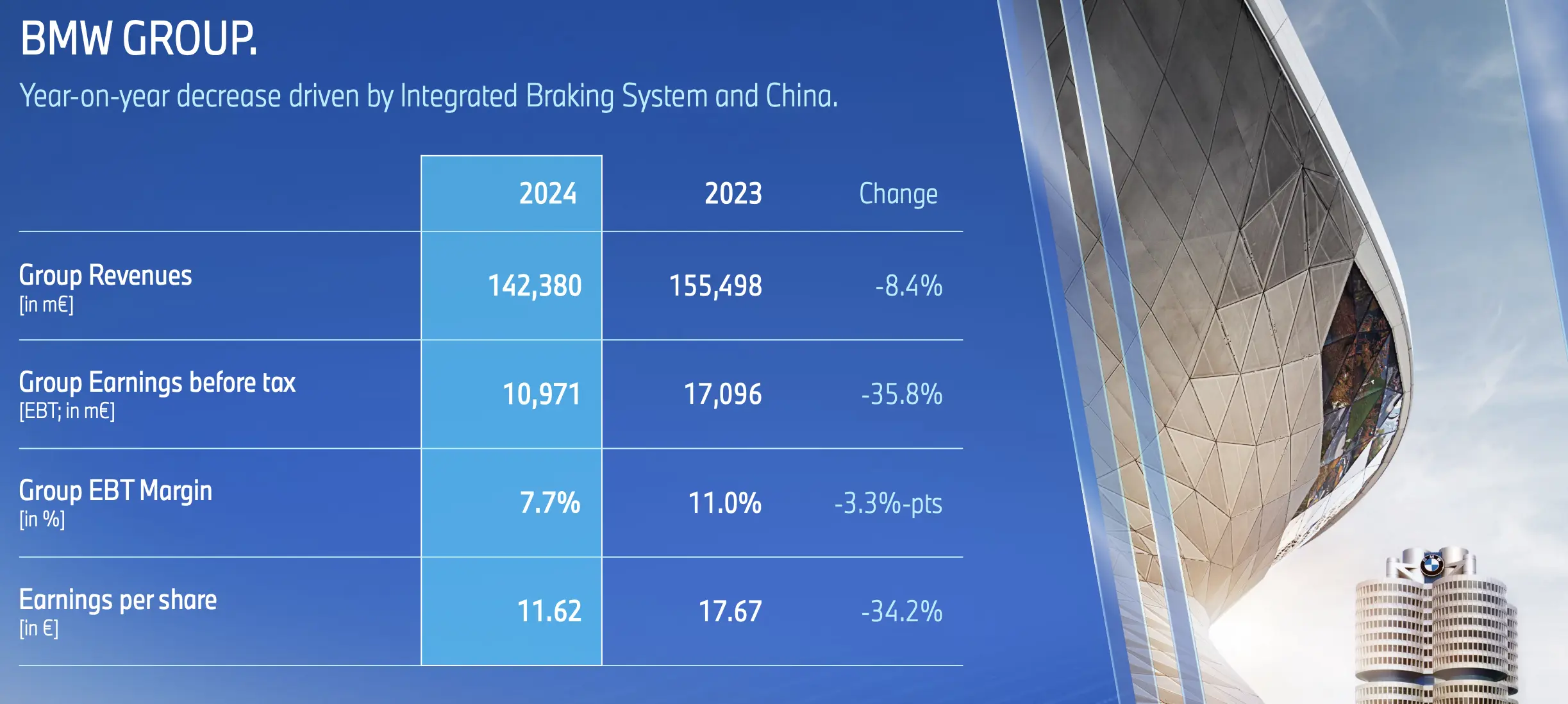The three major German automakers (Mercedes-Benz, BMW, and Volkswagen) released their reports and made announcements on their 2024 performance and overall events in late February and March 2025. All three companies saw a significant decline in overall revenue due to the impact of economic conditions in China and other regions.
In this article, we will review the performance of each company and discuss their direction for 2025. In particular, for Mercedes-Benz, I will also share some insights from R&D experiences.
Mercedes-Benz

Compared to 2023, revenue decreased by 4%, but operating profit (EBIT) saw a significant drop of 31%. The impact of the Chinese market was substantial, and despite launching a full lineup of electric vehicles, sales fell short of expectations.
Personally, I believe that the entry-level electric models (EQA, EQB, EQC) struggled due to being built on an internal combustion engine (ICE) platform, resulting in weaker driving range and charging efficiency. On the other hand, the premium models (EQE, EQS) were based on an electric vehicle (EV) platform but had highly polarizing designs. However, the EQE SUV and EQS SUV showed some improvements. Additionally, the EV adoption gap, along with growing concerns about electric vehicle fires—especially in markets like South Korea—further worsened public perception.
Recently, the next-generation CLA, which features an EV platform and the latest MB.OS, was unveiled on March 15, 2025. (Reference: [Automotive] - Mercedes-Benz New CLA Announcement & Software Development Insights). Overall, I believe this is the best and most well-executed electric vehicle from Mercedes-Benz to date.
MB.OS has also evolved significantly from the version introduced last year with the E-Class. The infotainment system was developed in collaboration with Qualcomm, while autonomous driving capabilities were enhanced through a partnership with NVIDIA, utilizing the most advanced SoCs currently available.
Internally, Mercedes-Benz is continuously improving MB.OS and striving for further advancements. Additionally, the company is focusing on the Chinese market by adopting a much more agile and rapid development process. I encourage everyone to keep an eye on these developments.
BMW

BMW experienced a much larger decline in sales compared to Mercedes-Benz. Unlike Mercedes-Benz, BMW presents its financial performance using pre-tax profit (EBT), which is calculated by subtracting interest from operating profit (EBIT). BMW’s pre-tax profit decreased by a significant 35.8% compared to 2023. The report explicitly attributes this decline to the impact of the Chinese market, and the company expects 2025 to remain at a similar level to 2024.
In 2025, BMW is set to introduce the Neue Klasse (THE NEUE KLASSE), aiming for a major transformation. (Reference:
2025.03.17 - [automotive] - BMW SDV (4 SuperBrains)
). This next-generation BMW vehicle will serve as the company’s flagship Software-Defined Vehicle (SDV), featuring an advanced EV platform and a Zonal E/E architecture.
Volkswagen

Volkswagen is the world's largest automaker by sales volume. With a vast number of brands under its umbrella, it operates under an extremely complex structure, making centralized management challenging.
Volkswagen presents its financial performance using profit after tax, which is calculated as operating profit (EBIT) minus interest and corporate tax or pre-tax profit (EBT) minus corporate tax. Despite deducting taxes, Volkswagen’s profit after tax remains higher than BMW’s pre-tax profit (EBT), indicating that Volkswagen is a significantly larger company than BMW. This is largely due to its diverse portfolio of well-known brands.
Volkswagen established Cariad, a subsidiary responsible for overseeing software development across the entire group. However, due to the sheer number of brands under its control, Cariad has struggled to play a central role effectively. In response, Volkswagen has been actively pursuing collaborations with other OEMs, such as Rivian, to secure technological advancements.
In the era of Software-Defined Vehicles (SDVs), Volkswagen’s highly intricate and intertwined corporate structure poses a significant management challenge.
Summary
The three major German automakers faced a challenging year in 2024. Internally, there have been ongoing discussions and rumors about cost-cutting measures and voluntary retirement programs. To be honest, the situation seems quite similar across all three companies. For instance, when colleagues leave, positions are often not refilled unless there is a special reason. 😥 With declining sales in China, the EV adoption gap, the race to secure SDV technology, and the overall economic downturn, 2025 is expected to be another tough year.
However, aggressive investments in SDV and future technologies will continue, and teams are working hard internally. Through collaborations with various suppliers, companies are making efforts to internalize key technologies, so it will be interesting to see how things develop. The soon-to-be-released CLA is one such achievement.
Reference
- Mercedes-Benz Report: https://group.mercedes-benz.com/investors/reports-news/annual-reports/2024/
- BMW Report: https://www.bmwgroup.com/en/investor-relations/annual-conferences.html
- BMW Neue Klasse: https://www.bmw.co.kr/ko/more-bmw/neue-klasse.html
- Volkswagen Report: https://www.volkswagen-group.com/en/annual-report-and-full-year-results-2024-19005
'automotive' 카테고리의 다른 글
| Hyundai Motor Developer Conference Pleos 25 (Keynote Review) (0) | 2025.03.29 |
|---|---|
| BMW SDV (4 SuperBrains) (0) | 2025.03.17 |
| AutomotiveMixed Criticality System (0) | 2024.11.22 |
| The state of EVs and SDVs in China (1) | 2024.11.20 |
| 2024 Presentations for Investors by Germany’s Three Major Automakers (1) | 2024.11.17 |



